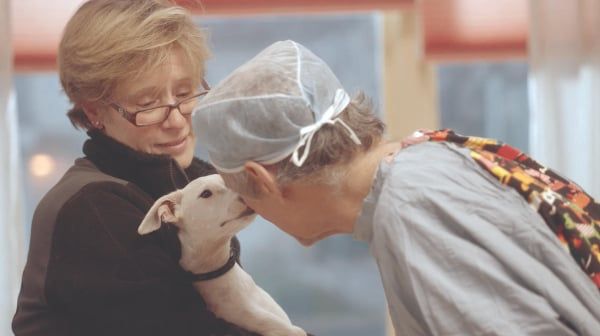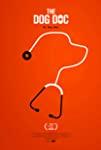Eye For Film >> Movies >> The Dog Doc (2019) Film Review
The Dog Doc
Reviewed by: Jennie Kermode

First things first: The Dog Doc is a film about a veterinary clinic which predominantly treats animals who have already been given terminal diagnoses or labelled untreatable elsewhere. If you're attracted to it because of the publicity stills and trailer featuring lots of cute animals, you won't be disappointed, but you should be aware that some of those animals are going to die.
Dr Marty Goldstein is unusual as practitioners of alternative medicine go because he acknowledges this at the outset. He also acknowledges that the treatment process for some animals is going to be a long one. The costs quoted at his clinic are not outrageously high and one gets the impression that he believes in what he's doing. Indeed, his patients themselves seem to trust him. One might hesitate, then, to dismiss him s another exploitative quack; but does his approach to treatment actually work?

Documentarian Cindy Meehl seems to have her mind made up at the outset. Her film has a hagiographic quality and at times the repeated compliments expressed about its central subject are liable to make your skin crawl even if you started out as a fan. Sentimental music and a big focus on cuteness contribute to the problem. Get beyond this, however, and there's quite a bit here to appreciate. It's a beautifully shot film which captures intimate interviews with people in difficult but very relatable situations. Meehl puts her animal subjects at ease and is relaxed enough with her human ones that they sometimes - Goldstein included - say a little bit more than they might have meant to.
What is it that Goldstein is actually providing by way of treatment? When he discusses it, he interweaves so many different threads that you'll need to be paying attention to tease them apart. He takes a holistic approach to medicine, which is to say that conventional techniques are part of the package at least some of the time. A major part his approach is focused on nutrition, and given the appalling quality of many popular pet foods sold in the US it's not at all surprising that this would get results. Indeed, his casual remark that most vets don't like to explore nutrition is somewhat on the generous side - no small number are bribed to promote unhealthy products.
Viewers outside the US should note that most countries have higher regulatory standards when it comes to pet food, and also that the US approach to vaccines is unusual - Goldstein attacks that too, with somewhat dubious science, though he's not anti-vax per se. His points are sometimes very sharp and one can see how this might convince some people - perhaps including himself - to miss the areas where his thinking is a lot more woolly. He's particularly bad at ruling out possible confounding factors in his various experiments, and one need only listen to his own words to observe that he doesn't have as much evidence for his various contentions as he thinks he does.
Despite this, it's evident that the highly individualised approach Goldstein takes is a great comfort to his patients, and his staff are plainly fulfilling an additional role as counsellors alongside their other duties. The impact on the animals is more varied. Some are plainly very ill from the outset, struggling to cope with basic movement and eating, yet warm to the attentive staff. Some were probably never going to be able to be saved. Some show real improvement, benefiting from the clinic's policy of enhancing rather than just extending life.
Given Meehl's obviously starstruck approach, this is a film that needs to be watched with caution and not taken too much at face value, but as it explores the fusion of techniques layered one upon another in Goldstein's practice, it highlights a number of areas where conventional practitioners could do better. it also celebrates, with none of the usual cynicism, the love that people have for their animal companions.
Reviewed on: 20 Mar 2020

















